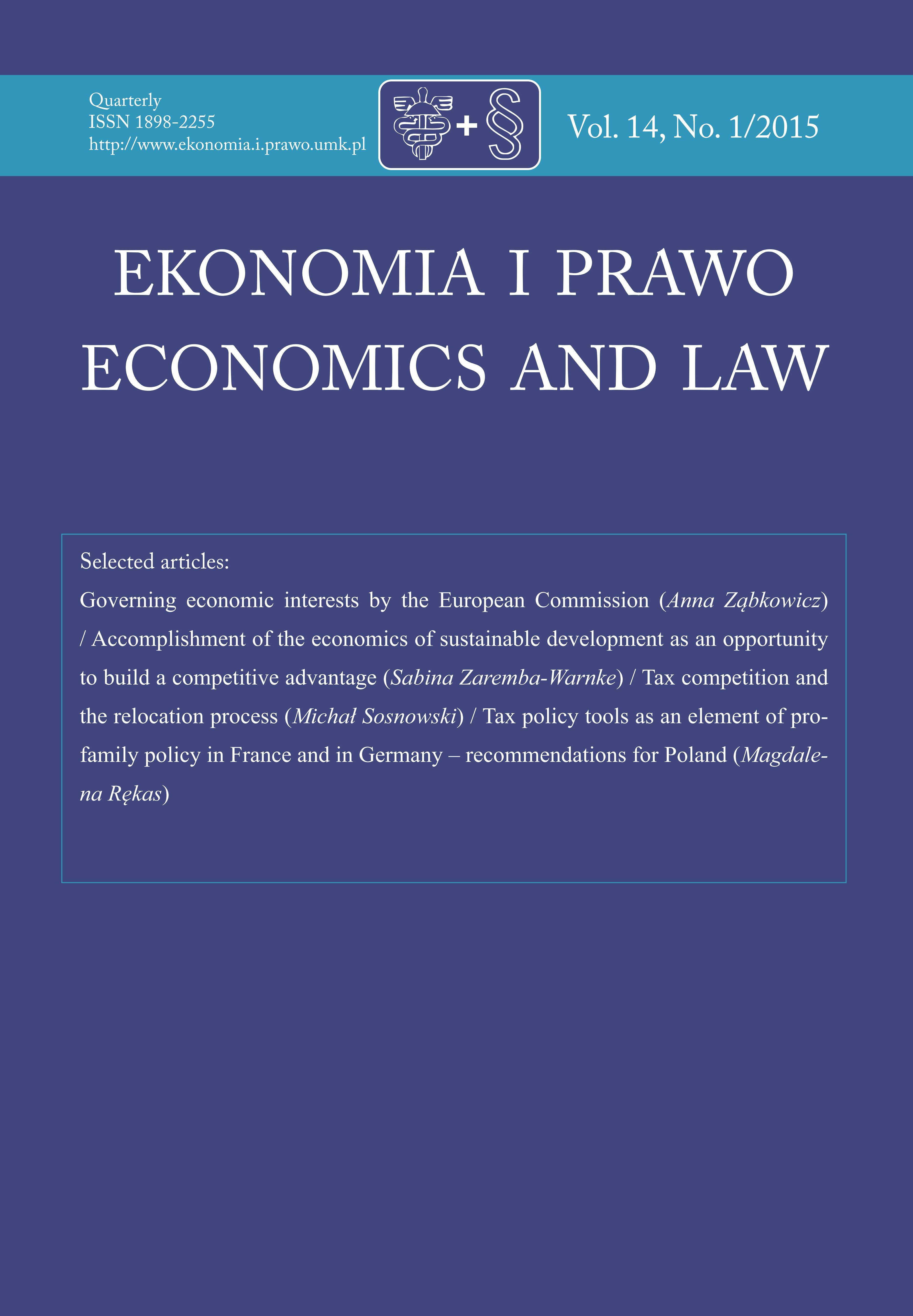CAPITALISM VS. SOCIALISM – AN ATTEMPT TO ANALYSE THE COMPETITIVENESS OF ECONOMIC SYSTEMS
DOI:
https://doi.org/10.12775/EiP.2015.005Keywords
economy, GDP per capita, standard of living, economic analysisAbstract
This article is devoted to the analysis of the competitiveness of economic systems (capitalism and socialism) in the years 1950-1989. The author assumed that competitiveness is the ability of the surveyed economies to build prosperity. Therefore, to compare the competitiveness of both socio-economic formations, the living standard of society – GDP per capita was used as a basic measure. The results of the analysis clearly indicated that capitalism (the system of the market economy) is more competitive than socialism (a system of planned economy). The study of competitiveness of economic systems requires a holistic approach and the application of research methods used in economics and economic history.
References
Aiginger K., Landesmann M., Competitive Economic Performance: USA versus EU, WIIW Research Reports, No. 2, November 2002.
Bauman Z., Socialism. The Active Utopia, George Allen & Unwin Ltd, London 1976.
Bornstein M., Comparative Economic Systems. Models and Cases, Richard Irwin, Inc., Homewood 1974.
Boumans M., Introduction, [in:] M. Boumans (ed.), Measurement in Economics a Handbook, Academic Press, Elsevier, Amsterdam 2007.
Buckley P.J., Pass C.L., Prescott K., Measures of International Competitiveness: A Critical Survey, „Journal of Marketing Management”, Vol. 4, No 2/1988, http://dx.doi.org/10.1080/0267257X.1988.9964068.
Commission of the European Communities, Benchmarking the Competitiveness of European Industry, COM(96)463 final, Documents EN1017, Brussels 09.10.1996.
Conklin D.W., Comparative Economic Systems, Cambridge University Press, Cambridge 1991.
de Soto J.H., Socialism: Economic Calculation and Entrepreneurship, Edward Elgar Publishing, Cheltenham, Northampton 2010.
Drucker P.F., Maciariello J.A., The Daily Drucker. 366 Days of Insight and Motivation for Getting the Right Things Done, HarperBusiness, New York 2004.
Esser K., Hillebrand W., Messner D., Meyer-Stamer J., Systemic Competitiveness. New Governance Patterns for Industrial Development, Frank Cass, London 1996.
Fagerberg J., Srholec M., Knell M., The Competitiveness of Nations: Why Some Coun-tries Prosper While Others Fall Behind, „World Development”, Vol. 35, No. 10/2007, http://dx.doi.org/10.1016/j.worlddev.2007.01.004.
Gardiner B., Martin R., Tyler P., Competitiveness, Productivity and Economic Growth across the European Regions, http://www-sre.wu-wien.ac.at/ersa/ersaconfs/ersa04/PDF/333.pdf (12.12.2013).
Gorynia M., Jankowska B., Klastry a międzynarodowa konkurencyjność i internacjonalizacja przedsiębiorstwa, Difin, Warszawa 2008.
Gottlieb M., A Theory of Economic Systems, Academic Press, Orlando 1984.
Gregory P.C., Stuart R.C., Comparative Economic Systems, Houghton Mifflin Co., Boston 1985.
Huggins R., Davies W., European Competitiveness Index 2006-07, Robert Huggins Associates Ltd, 2006.
Jagiełło E.M., Strategiczne budowanie konkurencyjności gospodarki, Wydawnictwo POLTEXT, Warszawa 2008.
Kowalik T., Systemy gospodarcze. Efekty i defekty reform i zmian ustrojowych, Funda-cja Innowacja, Warszawa 2005.
Krugman P., Competitiveness: A Dangerous Obsession, „Foreign Affairs”, Vol. 73, No. 2/1994, http://dx.doi.org/10.2307/20045917.
Madison A., Monitoring The World Economy 1820-1992, OECD, Paris 1995.
Misala J., Międzynarodowa konkurencyjność gospodarki narodowej, Polskie Wydaw-nictwo Ekonomiczne, Warszawa 2011.
OECD, Technology and the Economy: The Key Relationships, Paris 1992.
Porter M.E., Building the Microeconomic Foundations of Prosperity: Findings from the Microeconomic Competitiveness Index, http://citeseerx.ist.psu.edu/viewdoc/download?doi=10.1.1.194.4526&rep=rep1&type=pdf (04.12.2013).
Reiljan J., Hinrikus M., Ivanov A., Key Issues in Defining and Analysing the Competi-tiveness of a Country, University of Tartu, Tartu 2000, http://dx.doi.org/10.2139/ssrn.418540.
Rosenberg N., Birdzell L.E. Jr., How The West Grew Rich: The Economic Transfor-mation Of The Industrial World, Basic Books Inc., New York 1986.
Rychlewski E., Proces transformacji jako czynnik determinujący kształt systemu gospo-darczego, [in:] E. Mączyńska, Z. Sadowski (eds), O kształtowaniu ładu gospodar-czego, Polskie Towarzystwo Ekonomiczne, Warszawa 2008.
Samuelson R.J., The Rebirth of Capitalism, [in:] G. Morgenson (ed.), The Capitalist’s Bible. The Essential Guide the Free Markets – and why the Matter to You, Harper-Collins Publishers, New York 2009.
Schumpeter J., Capitalism, Socialism and Democracy, Routledge, London and New York 2003.
Schwab K. (ed.), The Global Competitiveness Report 2013-2014, World Economic Forum, Geneva 2013.
Scott B.R., U.S. Competitiveness: Concepts, Performance and Implication, [in:] B.R. Scott, G.C. Lodge (eds), U.S. Competitiveness in the World Economy, Harvard Business Scholl Press, Boston, Massachusetts 1985.
Sombart W., Why is there No Socialism in the United State, M.E. Sharpe, New York, 1976.
Tool M.R., Institutionalist View of Economic System [in:] K. Dopfer, K.F. Raible (eds), The Evolution of Economic System, St. Martin’s Press, New York 1990.
Tyson L., Who's Bashing Whom? Trade Conflicts in High-Technology Industries, Insti-tute for International Economics, Washington D.C. 1992.
Wilkin J., Jaki kapitalizm, jaka Polska?, Wydawnictwo Naukowe PWN, Warszawa 1995.
Woś A., Konkurencyjność polskiego sektora żywnościowego. Synteza, Instytut Ekono-miki Rolnictwa i Gospodarki Żywnościowej, Warszawa 2003.
Zielińska-Głębocka A., Konkurencyjność przemysłowa Polski w procesie integracji z Unią Europejską. Teoria, praktyka, polityka, Fundacja Rozwoju Uniwersytetu Gdańskiego, Gdańsk 2000.
Downloads
Published
How to Cite
Issue
Section
Stats
Number of views and downloads: 1126
Number of citations: 0
